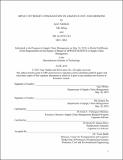| dc.description.abstract | The transportation sector is one of the two principal contributors to greenhouse gas emissions (GHG) and its contributions are expected to double by 2050. Growing consumer demand for home deliveries with high service levels at low costs is quickly becoming the standard. As a result, retailers are transforming their supply chains to meet these requirements through innovation in transportation. However fast delivery is a double-edged sword – it is expensive for companies to sustain and generates greenhouse gases from fuel combustion, which is harmful for the planet. Previous studies have shown that customers may be willing to wait for their deliveries if the environmental impact of fast delivery is presented to them. Specifically, customers are willing to wait for up to 4 days for their shipments if greener means of transportation are used for delivery. The increase in delivery lead time will present opportunities to make operational changes centered on consolidating shipments and increasing density in last mile routes, which will help reduce unit cost and emissions. This is the core focus of this project. Our research considers the impact of freight consolidation on Carbon Dioxide equivalent emissions and logistics costs for omnichannel home delivery. We analyze data from a large retailer in Mexico, derive insights on current operational metrics, apply heuristic methods to minimize trips and validate our hypothesis by means of experiments run on specific scenarios. We find that increased delivery lead times can lead to better route utilization, fewer trips to deliver customer shipments and therefore cost saving opportunities and lower emissions. | en_US |
